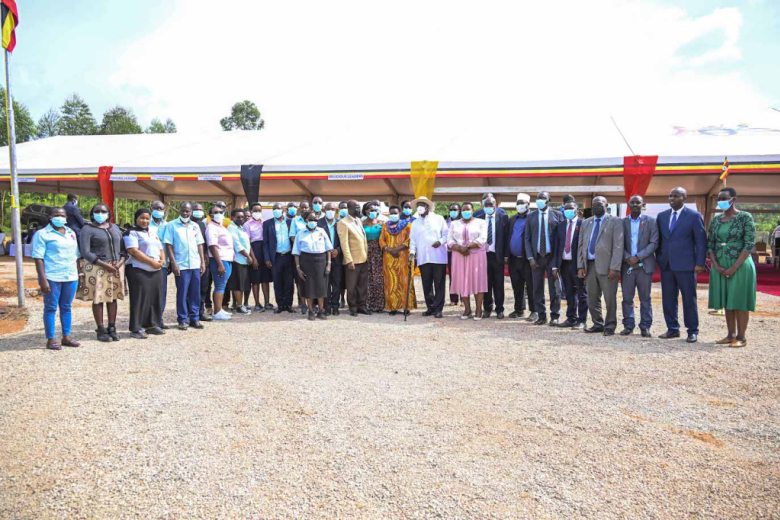
BY PPU REPORTER
President Yoweri Kaguta Museveni has re-emphasized the need for school authorities to fully implement free education policy in government schools to combat HIV/AIDS among adolescents aged 15 years and above.
“You said that young people who are not in school are the most vulnerable to HIV/AIDS but also this is due to not listening to my advice because in 1996 I introduced free Education in government schools but some people like the head teachers frustrated that arrangement, they make parents pay fees in government schools”, the President said.
“Such fees are the ones keeping children out of school. If you did that, you would liberate these young children from that dependence on other people prematurely. We should take it as one of the Anti-AIDS measures. The children from the poor homes should go to school and be looked after by the Republic of Uganda through free education.” he added.
According to the recent statistics from the Uganda AIDS Commission, about 52,000 new HIV infections and 17,000 AIDS related deaths occur per year. These new infections are occurring among the young girls and women between the age of 15 to 24 years.
“ Originally this virus took us by surprise, we didn't know where it was coming from, but within a short time we got to know that it was coming through sex and from that time, we told people that you can easily avoid this problem and when they do, it works. It doesn't spread. Now that we know where it comes from, why is it continuing to spread? From the data, it seems part of the problem are the young people from the age of 15 plus, who are desperate, and they surrender their lives to people who infect them,”.
The President made these remarks during the World AIDS Day commemoration held at Kibaale playground in Rakai District.
The event ran under the theme: “Ending AIDS by 2030, Keeping Communities at the Centre”.
Every year, on 1st December, the world commemorates the International AIDS Day where people around the globe unite to show support for people living with and affected by HIV and to remember those who lost their lives to the scourge.
The president further advised parents to keep their children in school to control the rising numbers of HIV infections among the young people.
President Museveni also reiterated his call to Ugandans to exercise prevention as the main strategy and solution in the fight against HIV/AIDS.
“Everyone should prevent himself from contracting HIV/AIDS and it is possible. You should counsel the children from the tender age that even though the treatment is available, if you get infected, the virus limits your health. So, to get the full potential of your life, avoid this virus. Prevention is the number one solution in our fight against HIV/AIDS,” President Museveni said.
President Museveni further urged parents to embrace government programs like Parish Development Model (PDM) and Emyooga to improve the livelihoods of their families and have their children not to become so desperate trying to sell themselves to make a living.
He also advised the people who are already living with the virus to live a positive life and take medication as prescribed by health practitioners.
“I want to thank people like Dr. Watiti and others because they have shown us that it is possible to live longer despite living with the virus,” he asserted.
“We want to do away with HIV/AIDS once and for all, we cannot continue keeping it here. Our scientists at Entebbe are working around the clock to ensure that we get the vaccine. We managed to vaccinate our people against Covid-19, it is no longer a threat. Even Ebola can be vaccinated among other diseases like polio. Fortunately, for HIV also, our scientists have assured me that there's hope. As you live, there are many other programs that can help us to end new infections. We have a program where we prevent an HIV positive expectant mother from infecting her newborn baby,” he added.
The Minister for Presidency, Hon. Babirye Milly Babalanda revealed that President Museveni's efforts in working with and supporting the scientists and other players in the fight against HIV and AIDS enabled Uganda to bring down the HIV prevalence from 18% in the 1990s when the Uganda AIDS Commission had just been created to now 5%.
The Minister also appreciated the AIDS Development partners for supporting Uganda in the fight against the virus.
“Specifically, I thank the United States Government through the President’s Emergency Plan for AIDS Relief (PEPFAR) that has invested greatly; directly here, nationally; but also, through upstream mechanisms such as the Global Fund. The support to our people since 2004 has been in HIV Prevention, Testing and Treatment interventions, Sir.”
The Minister of State for Primary Health Care, Hon. Margaret Muhanga asserted that this year's theme emphasizes the role of communities in the fight against HIV/AIDS and calls for collective action to empower and support communities to deal with the burden.
“It is in communities that diseases including HIV/AIDS infections occur, but it is also in communities where with appropriate message, the disease can be interrupted and stopped. Approximately, 1.4 million adults and children are living with HIV in this country but working together, we have registered remarkable progress to reduce infections,” she said.
The Director General of Uganda AIDS Commission (UAC), Dr. Nelson Musoba acknowledged the pivotal role of President Museveni's leadership that has successfully shaped Uganda's national response to HIV/AIDS.
“Uganda has been a trailblazer in implementing successful prevention and awareness programs which has served as a model for other nations. The government's commitment, the collaboration with donors has resulted in providing accessible and affordable antiretroviral treatment that has undoubtedly saved countless lives and demonstrated Uganda's dedication to the health and wellbeing of its citizens,” he said.
“Your Excellency, by the end of December 2022, we recorded 52,000 new infections, a slight reduction from again what we reported to you in Rukungiri last year where we told you that we had recorded 54,000 new infections in the previous year (2021) but we can do better because as you have told us, we can get zero new infections. That is the target by 2030.”
The UNAIDS Country Director, Ms. Jacqueline Makokha commended Uganda for its ability to successfully deal with epidemics like HIV/AIDS.
“Your Excellency, Uganda has demonstrated to the world what can happen when you combine strong political leadership, good science, solid health systems and a good community response to address epidemics. Uganda did it for HIV in the 1980s and it is still working on that, you did it for Covid-19 and recently for Ebola. These are remarkable achievements and must be celebrated,” Ms. Makokha noted.
“We are only left with 7 years to achieve our commitment to end AIDS as a public health threat. Many of us already know where efforts must be directed,” she added.
During the same function, the President received an award for his exemplary leadership in the fight against HIV/AIDS.
During the same function, distinguished persons/ organizations were recognized for their exceptional roles in the fight against HIV/AIDS in the country.
The event was also attended by the Vice President, H.E Jessica Alupo, Ministers, Members of Parliament, Members of the Diplomatic Corps, Greater Masaka leaders, religious leaders, among others.


